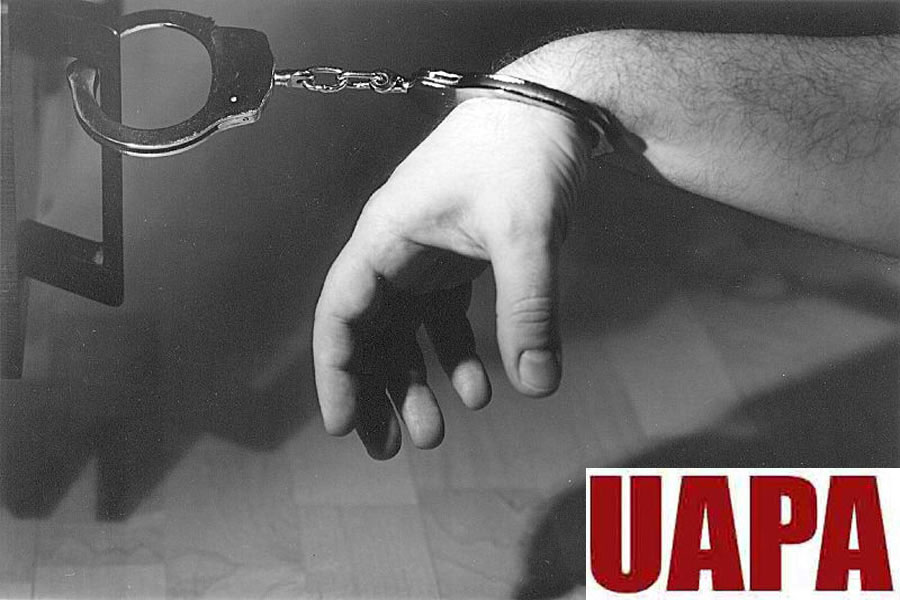The discourse on terrorism often devolves into positing that individuals’ rights can reasonably and necessarily be sacrificed at the altar of national security. Such an assertion is dangerous, and proceeds from a reactionary understanding of terrorism, and leaves one wondering for whom the State intends to secure peace through the erosion of freedoms.
The Unlawful Activities Prevention Act, 1967, was preceded by the Prevention of Terrorism Act, 2002, (POTA), and before that by the Terrorist and Disruptive Activities (Prevention) Act, 1987 (TADA). Both Acts were decried for being draconian, and for the widespread misuse of their provisions. However, unlike the UAPA, both legislations also had provisions that allowed for review of their functioning (‘sunset clauses’). TADA lapsed in 1995. The fate of POTA, which was enacted in 2002 in the aftermath of the Parliamentary attacks in 2001, was not too different: POTA was repealed in 2004.
The UAPA was enacted in 1967 as a measure to curb secession movements, but its origins can be traced to the Criminal Amendment Act, 1908, passed by Lord Minto to keep the colonial administration from appearing weak in the face of anarchical crimes. The titular “unlawful activity” has primarily been defined on those lines, but expanded further to include acts, words, or anything which ‘disclaims, questions, disrupts or is intended to disrupt the sovereignty and territorial integrity of India’ or ‘which causes or is intended to cause disaffection against India’.
Where ‘unlawful activities’ are concerned, the Central Government is empowered to declare an association as unlawful, requiring the cessation of all their activities, through a notification to that effect. The notification so issued is required to state the grounds on which the said association is being notified. Subsequently, the tribunal constituted under the act is required to determine if there is sufficient cause to bar that said association and accordingly confirm (or reject, as the case may be) the said notification after hearing both sides on the same. However, there are several procedural pitfalls, not the least of which is the power of the Central Government to withhold certain information in public interest. The practical “anatomy of a UAPA Tribunal” reveals how high the standard of procedural safeguards ought to be, and how miserably the existing framework falls short.
The transformation of the UAPA into a full blown anti- terror legislation was achieved systematically through a series of ill-conceived amendments co- opting several provisions of TADA and POTA into its framework (without incorporating any of the minimal protections thereunder). In 2004, in the wake of the repeal of POTA, the first amendment was introduced to the Act thereby bringing “terrorist activities” within its ambit. The issues with previous anti- terror legislations had ostensibly been solved by sleight of hand transferences of the old wine into a new bottle.
In 2008, the UAPA was amended further with the assurance that the interest of security would be balanced with civil liberties, while introducing provisions that flouted the most fundamental principles of criminal law. In 2012, the UAPA was amended introducing provisions including the expansion of the definition of “terrorist activities”, among other things. The 2019 Amendment to the UAPA empowers officers of the NIA, of the rank of Inspector or above to investigate cases, and extends the power of the Central Government to declare individuals as “terrorists”.
The Union Home Minister’s statement while defending the latest amendment of 2019 to the Unlawful Activities Prevention Act, 1967, can be used to illustrate how the legislation is used to suppress the individual. The Home Minister highlighted, among other arguments, that the Government has “no sympathy for Urban Maoists”, and that the designation of persons suspected of having terror links as ‘terrorists’ is necessary to root out terror. In that context, it is necessary to note that the Communist Party of India (Maoist) is banned under the UAPA scheme, and is regarded as a serious threat to security. However, the prevalent deployment of the term ‘Urban Naxal’ to designate any person who is anti- establishment or raises questions about the State’s functioning, casually in mentions on social media and even in extreme cases of executive excess to justify the arrests of several activists, has given the term new connotations.
Regardless of the same, designation as such accords automatic illegitimacy because of its ‘original’ meaning. Therefore, the aim of the legislation to root out such persons on mere suspicion, in the absence of substantial procedural safeguards, renders the individual vulnerable to the prejudices of the State. The insidious effect of the same is the reasonable apprehension that an exercise of one’s freedom to think and express freely can be construed and proved to be an affront to the State, inviting dire consequences.
For instance, in Britain, the “Prevent duty” introduced under the Counter-terrorism Act, imposes an obligation on universities and other institutions to have “due regard for the need to prevent people from being drawn into terrorism”. In its application, this led to a demonstrable chilling effect: self- censorship for fear of dire consequences on campuses, where the main targets of censorship were Muslim students. It is also clear that the most prevalent prejudice internationally, apparent in most anti- terror measures, is the Muslim-centric definition of terrorism.
In India, arrests and preventive detention under the UAPA scheme are deployed by the State against marginalized groups and activists (one of the most recent examples being the violence at Bhima Koregaon, during the investigation of which several activists were arrested and their homes raided under the Act). Naturally, this results in the ‘chilling effect’. It also affects one of the most important facets of the right to privacy—the right to self- determination. The Act, therefore, empowers the State to perpetuate inequalities, and therefore fails on more than one account.
Over the decades during which the UAPA and other similar legislations have been in force, different administrations have targeted certain minority groups and delegitimized their exercise of rights; conversely, the same administrations have legitimized other forms of violent agitation from different groups, leaving them unchecked under the different applicable laws. The UAPA, therefore, also has far reaching consequences into the exercise of cultural and religious rights guaranteed by the Constitution. When one group’s identity is the source of suspicion, the constitutional guarantee is violated and their rights are rendered illusory.
Meaningful citizenship transcends formal recognition—it extends to the meaningful exercise of guaranteed rights. The Act empowers the State to interfere with two fundamental aspects (beyond what is constitutionally permissible): the exercise of rights, and what group of citizens is permitted to exercise them. Through this the State essentially promotes certain meanings of citizenship over others, rendering citizens unsure and insecure of their place in the Indian democracy.
Aside from the deeply problematic definition of terrorism, the Act dispenses with several cardinal principles of criminal law. People can be arrested on mere suspicion, then detained for prolonged periods; bail is the exception not the rule and, there is no provision for anticipatory bail. The presumption of innocence is reversed where there exists any material connected to the commission of a terrorist Act that can be linked to the individual, and also permits usage of evidence obtained through wiretapping. The power of the State under the Act is disproportionately stacked against the individual.
The Act also invokes international treaties on combating terrorism and seemingly complies with them conceptually. But it ignores several long-standing, internationally recognized legal principles and obligations: the commensurate protection of individual freedoms, the presumption of innocence, the right to a fair trial et al. The need to define terrorist act in distinct terms has also been articulated at the international level. The Special Rapporteur on the Protection of Human Rights and Fundamental Freedoms while Countering Terrorism calls for specificity in how terrorism is defined, distinguishing it from other crimes. By making an overboard definition of terrorism, the complexity, the involvement, and the severity of the act are not considered while taking action against it, thereby rendering such action inadequate and ineffective.
The Act and its supporting arguments are premised on a normative assertion that individuals ought to act in agreement with their governments. One way in which it does this is by defining terrorist activities so broadly that acts that are likely to threaten Governments fall within its ambit. The Act forces into its purview all forms of dissidence, even peaceful agitation. Therefore, the narrative that emerges is that individuals ought to ‘trust’ their Governments—unquestioningly, and further, that citizens should strive to be trusted by their Governments, by performing citizenship as opposed to participating as citizens in a democracy.
Support for the UAPA as a piece of legislation arguably asserts the premise of a ‘neutral’ State devoid of a distinct ideology. In actuality it accords the ideologies of different political parties a pedestal from which individuals are to be judged. If security is understood through the prism of constitutional values, the individual, and the protection of their interests, would occupy centre stage. How Governments understand and tackle terrorism with the individual at the center as opposed to a self-centric understanding that is ever-changing as different political parties come into power, would change the measures taken to tackle the same.
The scheme of the Act ensures that guilt attaches itself to the individual/association before they have been given any chance of a defence, thereby contravening their fundamental rights, and the fundamental and indispensable principles of criminal law. The reversal of the presumption of innocence where the accused may even be denied information (that they should be reasonably allowed to examine and defend themselves against) renders the entire procedure farcical. Even in the event of their discharge, the person bears the stigma of having been designated a terrorist. But while it may seem like the 2019 Amendment is the most problematic element of the Act, it is only the most recent.
In light of the same, it is important to always remember that securing public safety, ensuring that fundamental rights are not violated, and ensuring a framework within which they can be meaningfully exercised, are all duties of the State. The State ought to balance these interests in compliance with the Constitutional framework, not in contravention thereof.







